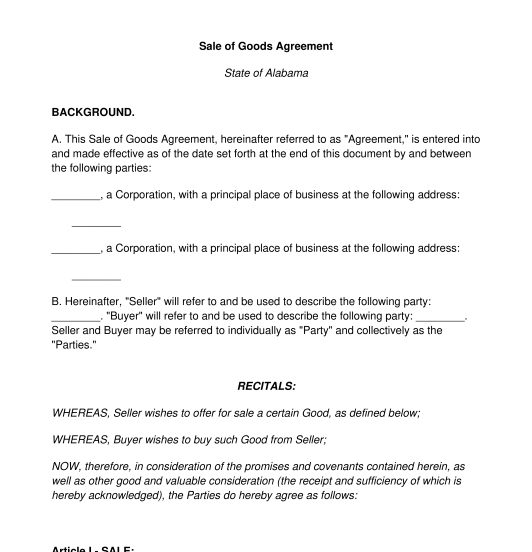 09/29/2025
09/29/2025

Answer a few questions and your document is created automatically.

Your document is ready! You will receive it in Word and PDF formats. You will be able to modify it.




Rating: 4.8 - 443 votes
Download a basic template (FREE) Create a customized documentA sale of goods agreement, also sometimes called a sales agreement or sales contract, is a document that a buyer and seller can use to outline the terms of purchase of certain goods. This agreement can cover the sale of any type of good and any type of sale, whether it's a one-time sale or multiple shipments over time.
There are many types of specific sale of goods documents. Though this document is general purpose and can be used to sell any tangible and movable items from one party to another, parties may instead choose to use a document more specifically tailored to their purposes. For example, a vehicle sale agreement may be used to sell a car, boat, or other type of vehicle.
Though both documents are used to memorialize an agreement between a buyer and a seller, they are used to sell different types of things. A sale of goods is used to sell tangible and movable items from one party to another. Some examples of goods are furniture, cars, collectibles, raw materials, or agricultural products. A property sale agreement is used for the sale of what is known as real property. Real property is land and anything attached to that land. Examples of real property would be a farm, house, or vacant lot.
No, it is not mandatory to use a sale of goods agreement. A buyer and seller could orally agree to terms for a more informal sale. However, this type of agreement is highly advisable to protect both the buyer and seller, especially in situations involving large purchases or many separate purchases over time. Using a written sale of goods agreement ensures that both parties understand the terms of the agreement and helps avoid misunderstands and disputes.
A deposit is a partial payment made by the buyer to the seller before the purchase is complete. By using a deposit, a buyer can demonstrate that they are serious about the sale and intend to complete the purchase. This deposit can either be refunded to the buyer once the purchase is completed or applied to the final purchase price.
Both individuals and businesses may enter into sale of goods agreements. For individuals, they must be of legal age to enter into a contract, 18 years of age or older in most states. They must also be mentally competent to enter into a contract. Business entities must have the legal authority to do so, usually outlined in the business' governing documents, such as bylaws or operating agreement.
Once this document has been completed and reviewed, it should be printed out and signed by both the buyer and the seller. The parties should each save a copy of the sale of goods agreement in their files for future reference and in case of dispute or disagreement.
Under certain circumstances, it is possible to cancel a sale of goods agreement. Through mutual agreement, both parties may agree to cancel the contract. A party is able to unilaterally cancel the contract if the other party does not abide by its terms and effectively breaches the contract. For example, if the buyer does not pay the seller the agreed upon price by the date laid out in the contract, the seller is free to cancel the contract and not deliver the goods that were to be sold. If the seller does not deliver the goods on time or delivers them in a damaged condition, the buyer may cancel the contract and refuse payment.
A valid sale of goods agreement must contain at least the following mandatory clauses:
In addition to the above mandatory information, the following information may also be included:
Sales of goods agreements are governed by both state and federal laws. The Uniform Commercial Code (UCC) is a list of laws that control the sale of goods and has been adopted by all 50 states individually. In addition to the UCC, most states have their own state commercial codes that concern the sale of goods.
You fill out a form. The document is created before your eyes as you respond to the questions.
At the end, you receive it in Word and PDF formats. You can modify it and reuse it.
Sale of Goods Agreement - FREE - Sample, template
Country: United States